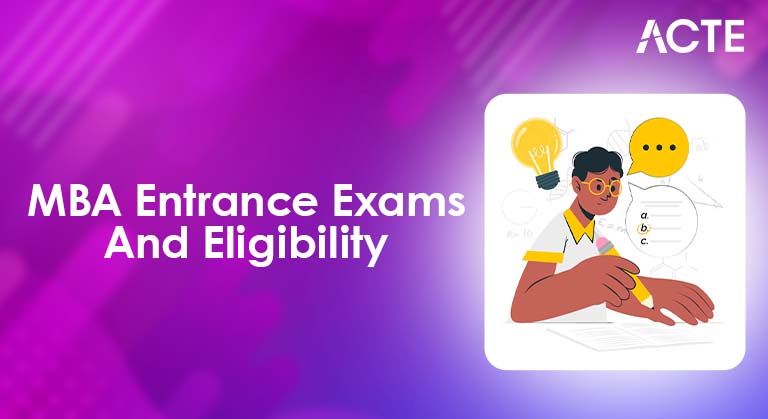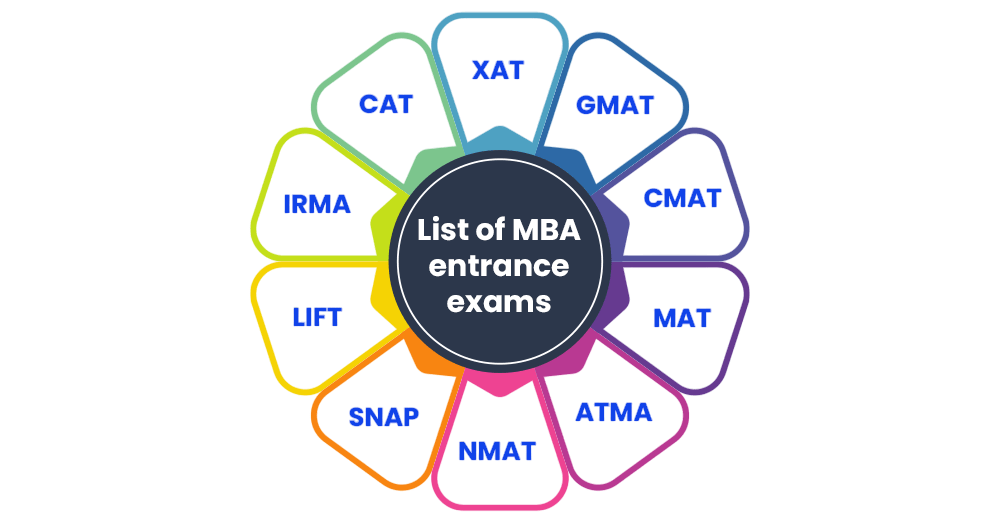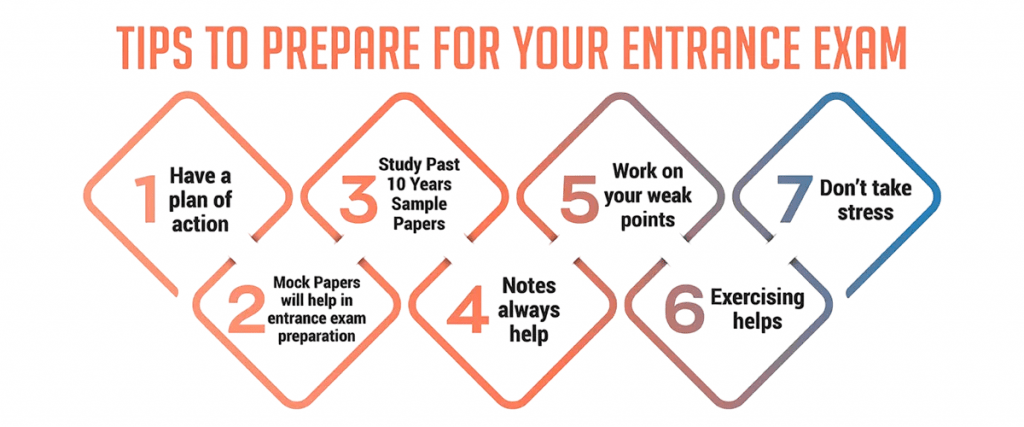
- Introduction to MBA Exams
- Types of MBA Entrance Exams
- Popular MBA Exams (CAT, GMAT, etc.)
- Eligibility Criteria
- Syllabus and Exam Pattern
- Preparation Tips
- Best Books for Preparation
- Common Mistakes to Avoid
- Admission Process After Exam
- Score Validity and Reapplication
- MBA Exams Abroad
- Conclusion
Introduction to MBA Exams
The MBA (Master of Business Administration) is one of the most sought-after degrees in the world. It opens doors to high-paying jobs and leadership positions across industries. However, to get into top business schools, candidates must first pass an entrance exam. These exams assess a candidate’s analytical ability, reasoning skills, and knowledge base. Given the competitive nature of MBA admissions, understanding the exam structure and preparation methods is crucial for success. In this article, we’ll explore the types of MBA entrance exams, the popular ones, eligibility criteria, patterns, preparation tips, and more. Whether you’re aiming for an MBA in India or abroad, this guide will help you navigate the entire process.
To Explore PMP in Depth, Check Out Our Comprehensive PMP Certification Training To Gain Insights From Our Experts!
Types of MBA Entrance Exams
MBA entrance exams can be broadly classified into two categories: national exams and institutional exams.
- National Exams: These are conducted at a national level and are accepted by a wide range of business schools. Examples include the CAT (Common Admission Test), XAT (Xavier Aptitude Test), and MAT (Management Aptitude Test). These exams are typically taken by thousands of candidates each year and offer a broad choice of colleges.
- Institutional Exams: Some prestigious business schools have their own entrance exams. For instance, IIMs (Indian Institutes of Management) conduct CAT, while SP Jain has the SPJET exam. These exams are tailored to test skills specific to the institution.
Additionally, there are exams for international MBA programs, such as the GMAT (Graduate Management Admission Test) and GRE (Graduate Record Examinations).
Popular MBA Exams (CAT, GMAT, etc.)
There are several entrance exams that you can appear for to pursue an MBA. The most popular exams include
- CAT (Common Admission Test): CAT is the most popular MBA entrance exam in India and is conducted by the IIMs (Indian Institutes of Management). It tests candidates on Quantitative Ability (QA), Verbal Ability and Reading Comprehension (VARC), and Data Interpretation and Logical Reasoning (DILR). The exam is highly competitive, and the scores are used by many top business schools in India.
- GMAT (Graduate Management Admission Test): The GMAT is a global MBA entrance exam recognized by thousands of business schools around the world. It evaluates a candidate’s Analytical Writing, Integrated Reasoning, Quantitative, and Verbal skills. GMAT scores are accepted by top-tier business schools in countries like the USA, Canada, the UK, and others.
- GRE (Graduate Record Examinations): While primarily used for graduate admissions, the GRE is also accepted by several business schools for MBA programs. It tests Verbal Reasoning, Quantitative Reasoning, and Analytical Writing. It is especially popular among candidates applying to programs that are not just MBA-focused but also specialized business programs.
- XAT (Xavier Aptitude Test): XAT is another highly recognized exam, conducted by XLRI Jamshedpur. It assesses candidates in areas like Verbal and Logical Ability, Quantitative Ability, and Decision Making. XAT is accepted by more than 150 management institutes in India.
- MAT (Management Aptitude Test): MAT is an entrance exam conducted by AIMA (All India Management Association). Unlike CAT, MAT is conducted multiple times throughout the year and is accepted by over 600 business schools in India. It assesses candidates in Language Comprehension, Mathematical Skills, Data Analysis, and Intelligence & Critical Reasoning.
- Duration: 180 minutes | Questions: 76–100
- Verbal Ability & Reading Comprehension (VARC) – 24 questions
- Data Interpretation & Logical Reasoning (DILR) – 20 questions
- Quantitative Ability (QA) – 28 questions Topics include arithmetic, data analysis, reading comprehension, algebra, and geometry.
- Duration: 3 hours 7 minutes | Questions: 80
- Analytical Writing Assessment (AWA) – 1 essay
- Integrated Reasoning (IR) – 12 questions
- Quantitative Reasoning (QR) – 31 questions
- Verbal Reasoning (VR) – 36 questions Focuses on arithmetic, grammar, logic, problem-solving, and data analysis.
- Duration: 3 hours 45 minutes | Questions: 80–100
- Verbal Reasoning – 40 questions
- Quantitative Reasoning – 40 questions
- Analytical Writing – 2 essays Covers core math, sentence structure, and logical reasoning.
- How to Prepare for CAT” by Arun Sharma
- Quantitative Aptitude for Competitive Examinations by R.S. Agarwal
- Verbal Ability and Reading Comprehension for CAT by Nishit Sinha
- The Official Guide for GMAT Review by GMAC
- Kaplan GMAT Prep by Kaplan Test Prep
- GMAT Math Bible by Jeff Sackmann
- The Official GRE Super Power Pack by ETS
- Kaplan GRE Prep by Kaplan Test Prep
- Barron’s GRE by Sharon Weiner Green
- Ignoring Time Management: MBA exams are time-bound, and time management is essential. Avoid spending too much time on a single question.
- Neglecting Mock Tests: Mock tests are vital for practice. Skipping them means missing the opportunity to understand your strengths and weaknesses.
- Not Revising Regularly: Revision helps reinforce concepts. Don’t wait until the last minute to revise important topics.

Eligibility Criteria
MBA admissions examinations, a candidate must fulfill certain intellectual and general qualifications. The primary criterion is an educational qualification; candidates have to have a bachelor’s degree from an accredited university, maybe a three-year or a four-year course. While the degree may be in any subject, tests such as the CAT require at least 50% of the possible points for graduation (45% for reserved categories). Unlike the CAT and XAT, the majority of Indian MBA entrance tests have no predetermined age restrictions. There is also no age limit for applicants for foreign exams like the GMAT. For the majority of tests, although it might be beneficial, work experience is not necessary. Though recent graduates are also eligible and often approved, many of the top business schools, including the IIMs, prefer applicants with job experience. Indian citizens can take tests like the CAT for their nationality; candidates of any nationality can take global tests like the GMAT and GRE, hence fitting candidates from all over.
Syllabus and Exam Pattern
Although each MBA entrance exam has its own format and syllabus, most of them assess common core skills such as logical reasoning, verbal ability, and quantitative aptitude.
Here’s a brief overview of the most popular exams:
CAT (Common Admission Test):
GMAT (Graduate Management Admission Test):
GRE (Graduate Record Exam):
Together, these exams help determine a candidate’s readiness for the academic rigor of MBA programs.
Preparation Tips
Passing an MBA entrance exam calls for a properly coordinated study schedule. Start by really knowing the exam structure, as this will allow you to use your time intelligently during the test. Knowing the structure helps you to give each section the right amount of time. Then, design a workable study schedule that fits around your usual activities. With an emphasis on the areas you struggle with, be sure your plan is consistent and assigns a certain time for each component. It is just as important to regularly take mock exams. These tests allow you to get acquainted with the exam format, quicken your pace, and spot areas requiring development. Focus on the basics is just as crucial. Develop your knowledge of fundamental subjects such as English grammar, logical reasoning, and quantitative ability. Pay extra attention to key areas, including data analysis, reading comprehension, and algebra.

Finally, for tests like CAT and XAT including general awareness sections, follow current events and business news. Staying informed is not only helpful for improving one’s marks but also for future success in group conversations and interviews during the admissions process.
Are You Preparing for PMP Jobs? Check Out ACTE’s Project Management Interview Questions & Answer to Boost Your Preparation!
Best Books for Preparation
Here are some popular books to help you prepare for MBA entrance exams:
For CAT:
For GMAT:
For GRE:
Are You Interested in Learning More About PMP? Sign Up For Our PMP Certification Training Today!
Common Mistakes to Avoid
Admission Process After Exam
Normally, the admissions process entails a few major stages following your MBA entrance test. During the first stage, called shortlist, institutes first assess candidates based on their exam scores and invite selected candidates to the next round, generally comprising a Group Discussion (GD), Personal Interview (PI), or Written Ability Test (WAT). Following these Admission Process reviews, the next step in the process is the final selection round. Here, they establish a merit list using test scores, academic background, job experience (if relevant), and performance in the GD/PI/WAT. Admission Process After being selected, the candidate has to complete the process of submitting documents and costs. Reserving their spot in the program requires payment of the admission fees in addition to submitting the needed documentation, including mark sheets, degree certificates, and identification documentation.
Score Validity and Reapplication
Most MBA entrance exam scores are valid for 1 year. However, candidates can reapply the following year if they wish to improve their score. Some exams, like the GMAT can be taken multiple times in a year, but others have specific dates.
MBA Exams Abroad
If you plan to pursue an MBA abroad, exams like the GMAT and GRE are commonly accepted. Business schools in the US, Canada, the UK, and Europe typically require these exams, and some schools also require English language proficiency tests (like TOEFL or IELTS).
Are You Considering Pursuing a Master’s Degree in PMP? Enroll in the PMP Masters Program Training Course Today!
Conclusion
Getting ready for MBA entrance exams can be tough, but with the right plan, helpful resources, and a positive attitude, you can succeed. Whether you want to get into Indian schools like the Indian Institutes of Management (IIMs) or international universities, it’s important to understand the different types of exams, their formats, and the best ways to prepare. Knowing these elements will give you a better chance to do well. First, focus on building your basic skills. This means working on important subjects like math, English, and logical reasoning. These subjects are the foundation of many MBA entrance exams. Make sure you are comfortable with the basics before moving on to more difficult topics. Once you feel confident in your fundamentals, it’s time to practice regularly. Regular practice helps you get used to the types of questions you will face and speeds up your problem-solving. Another key part of preparing for these exams is creating a study schedule. This schedule should include specific times for studying each subject, taking practice tests, and reviewing your answers. Sticking to a schedule will help you stay organized and make sure you cover all the necessary material before the exam date. Also, make sure to use a variety of study resources. You can find helpful books, online courses, and mobile apps that offer practice questions and mock tests. Having these resources will give you different perspectives on the material and help you learn in a way that suits you best.

